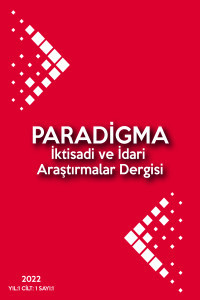FİNANSAL OKURYAZARLIK DÜZEYİ VE DAVRANIŞLARI: GÜMÜŞHANE ÜNİVERSİTESİ ÖNLİSANS ÖĞRENCİLERİ ÜZERİNDE BİR ARAŞTIRMA
Finansal okuryazarlık, bireylerin paranın kullanımı ve yönetimi konusunda temel bilgi ve beceri sağlayan yeterlilik düzeyini ifade etmektedir. Finansal açıdan yeterlilik önemli bir kavramdır. Zira bireyin vereceği kararları doğrudan yada dolaylı etkileyebilmektedir. Bu çalışmanın temel amacı, üniversite öğrencilerin finansal okuryazarlık düzeyini ve davranışlarını tespit etmektir. Veri toplama aracı olarak anket yöntemi kullanılmıştır. Belirlenen amaç doğrultusunda Gümüşhane Üniversitesi önlisans programlarında kayıtlı öğrencilere anket uygulanmıştır. Çalışmada çoklu regresyon analizi kullanılmış ve üç adet model oluşturulmuştur. Özellikle parayı harcama ve yönetme başarısını etkileyen unsurların belirlenmeye çalışılan çalışma sonucunda, öğrencilerin finansal okuryazar olmadıkları ve temel finansal kavramlar hakkında çok az bilgiye sahip oldukları belirlenmiştir.
Anahtar Kelimeler:
Finansal Okuryazarlık, Bireysel Finansman, Davranışsal Finans, Çoklu Regresyon Yöntemi
FINANCIAL LITERACY LEVELS AND BEHAVIOR: A RESEARCH ON GUMUSHANE UNIVERSITY ASSOCIATE STUDENTS
Financial literacy refers to the level of proficiency of individuals that provides basic knowledge and skills in the use and management of money. Proficiency is an important concept in terms of finance. Because it can affect either directly or indirectly the financial decisions of individuals. The main purpose of this study was to determine the level of financial literacy and behavior of university students. Survey method was used as data collection tool. Survey was applied to students who registered in Gumushane University associate degree programs, in accordance with the designated purpose. Multiple regression analysis used in this study and three model has been developed. In this study, especially was tried to determine the factors affecting the success of spending and managing of money. The result of this study, we observe that student have little information about basic financial concepts and furthermore students' financial literacy levels are low
___
- AL-TAMIMI, Hussein A. Hassan ve Al Anood Bin KALLI, (2009), "Financial Literacy and Investment Decisions of UAE Investors", Journal of Risk Finance, 10(5), 500-516.
- ALMENBERG, Johan ve Jenny SAVE-SODERBERG. (2011), “Financial Literacy and Retirement Planning in Sweden”. Network for Studies on Pnesions, Ageing and Retirement Discussion Papers,112, 1-28.
- BEAL, Diana ve Sarath DELPACHITRA. (2003), “Financial Literacy among Australian University Students, Economic Papers: a Journal of Applied Economics and Policy, 22 (1), 65-78.
- CHEN, Haiyang ve Ronald P. VOLPE (2002), ‘’Gender differences in personal financial literacy among college students’’ Financial Services Review, 11(3), 289-307.
- COLE, Shawn; Thomas SAMPSON ve Bilal ZİA. 2008. “Money or Knowledge? What Drives The Demand for Financial Services in Developing Countries?”, Harvard Business School Working Paper, No. 09-117, 1-51.
- DANES, Sharon M.ve Tahira K. HİRA, T. K. (1987), “Money Management Knowledge of College Students”, The Journal of Student Financial Aid, 17, 4–16.
- DUCA, John ve Anil KUMAR (2014), “Financial Literacy and Morgage Equity Withdrawals”, Journal of Urban Economics, 80, 62-75.
- ERGÜN, Bahadır; Arzu ŞAHİN ve Erhan ERGİN (2014), ‘’Finansal Okuryazarlık: İşletme bölümü öğrencileri Üzerine Bir Çalışma’’, The Journal of International Social Research, 7(34) ,847-863.
- GOEL, Isha ve Sri Ram KHANNA (2013). “Financial Education as Tool to Achieve Financial Literacy”, Eastern Economic Forum.338-345.
- GÖKMEN, Habil (2012), Finansal Okuryazarlık, İstanbul: Hiperlink Yayınları.
- HİLGERT Marianne A ve Jeanne M. HOGARTH (2003), “Household Financial Management: The Connection Between Knowledge and Behavior”, Federal Reserve Bulletin, 89 (7), 309-322.
- HOGARTH, Jeanne M. (2002), “Financial Literacy and Family and Consumer Sciences”, Journal of Family and Consumer Sciences. 94, 15-28.
- JORGENSEN, Bryce L. ve Jyoti SAVLA (2010), “Financial Literacy of Young Adults: The Importance of Parental Socialization”, Interdisciplinary Journal of Applied Family Studies, 59(4), 341-393.
- KLAPPER, Leora ve Georgias A. PANOS (2011), “Financial Literacy and Retirement Planning: the Russian Case”, Journal of Pension Economics and Finance 40(4), 599-618.
- LUSARDI, Annamaria ve Olivia S. MITCHELL ( 2009), “How Ordinary Consumers Make Complex Economic Decisions: Financial Literacy and Retirement Readiness”, NBER-National Bureau of Economic Research, Working Paper No:15350, 1-37.
- LUSARDI, Annamaria (2008), “Financial Literacy: An Essential Tool for Informed Consumer Choice” Joint Center for Housing Studies of Harvard University, 1-26.
- LUSARDI, Annamaria ve Olivia S. MITCHELL (2007), “Baby Boomer Retirement Security: The Roles of Planning, Financial Literacy, and Housing Wealth”. Journal of Monetary Economics, 54, 205-224.
- MANDELL, Lewis (2007), Financial literacy of high school students, In J.J. Xiao (Ed.), Handbook of Consumer Finance Research (pp. 163-183). New York, NY: Springer.
- MARKOVİCH, Charli A. ve Sharon A. DEVANEY (1997), “College Seniors’ Personal Finance Knowledge and Practices”, Journal of Family and Consumer Sciences, 89, 61–65.
- MOORE, Danna (2003), Survey of Financial Literacy in Washington State: Knowledge, Behavior, Attitudes, and Experiences, Technical Report n. 03-39, Social and Economic Sciences Research Center, Washington State University.
- PAHNKE, Luise ve Ivonne HONEKAMP (2010), ‘’Different Effects of Financial Literacy and Financial Education in Germany’’ University of Bamberg, Chair in Economics, Especially Empirical Microeconomics Graduate Thesis.
- REMUND, David L. (2010), “Financial Literacy Explicated: The Case for a Clearer Definition in an Increasingly Complex Economy”,Journal of Consumer Affairs, 44(2), 276-292.
- ROOİJ, Maarten V; Annamaria LUSARDI ve Rob ALESSİE R.,(2007), ‘’Financial Literacy and Stock Market Participation’’ DNB Bank Working Paper, No:13565, 1-50.
- TEMİZEL, Fatih ve Fatih BAYRAM ( 2011), “Finansal Okuryazarlık: Anadolu Üniversitesi İktisadi İdari Bilimler Fakültesi (İİBF) Öğrencilerine Yönelik Bir Araştırma”, Cumhuriyet Üniversitesi İktisadi ve İdari Bilimler Dergisi, 12(1), 73-86.
- VOLPE, Ronald P; Haiyang CHEN ve Sheen LİU (2006),“An Analysis of the Importance of Personal Finance Topics and the Level of Knowledge Possessed by Working Adults”, Financial Services Review, 15(1), 81–99.
- VOLPE, Ronald P; Joseph E. KOTEL ve Haiyang CHEN. (2002), A Survey of Investment Literacy Among Online Investors. Financial Counseling and Planning, 13 (1): 1–13.
- WORTHİNGTON, A.C. (2006), “ Predicting financial literacy in Australia”, Financial Services Review, 15(1), 59–79.
- Yayın Aralığı: Yılda 2 Sayı
- Yayıncı: Gümüşhane Üniversitesi
